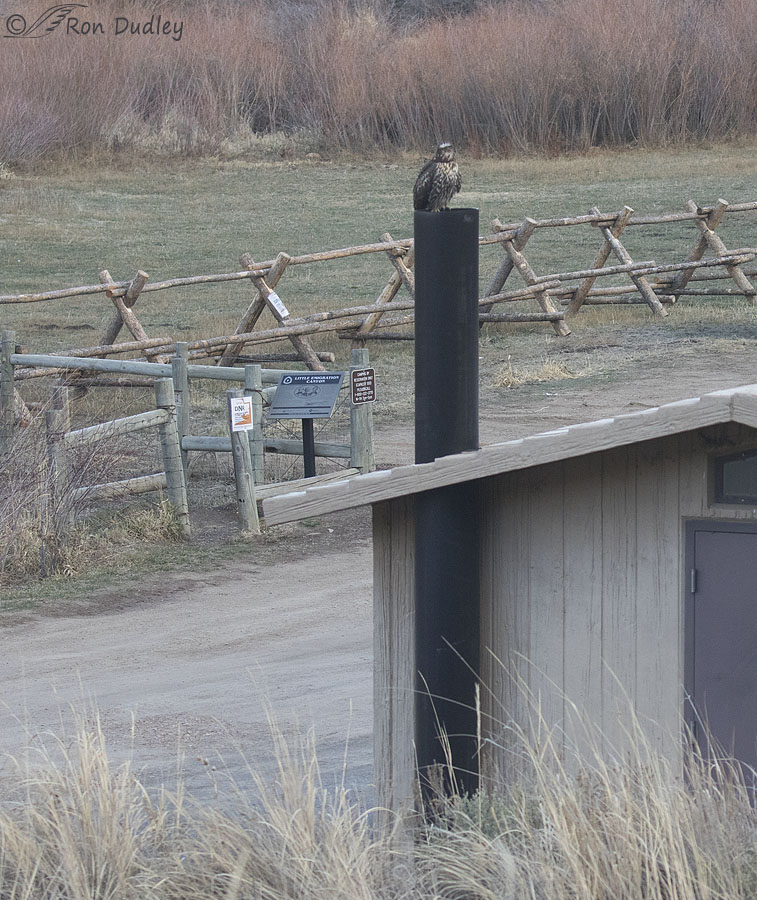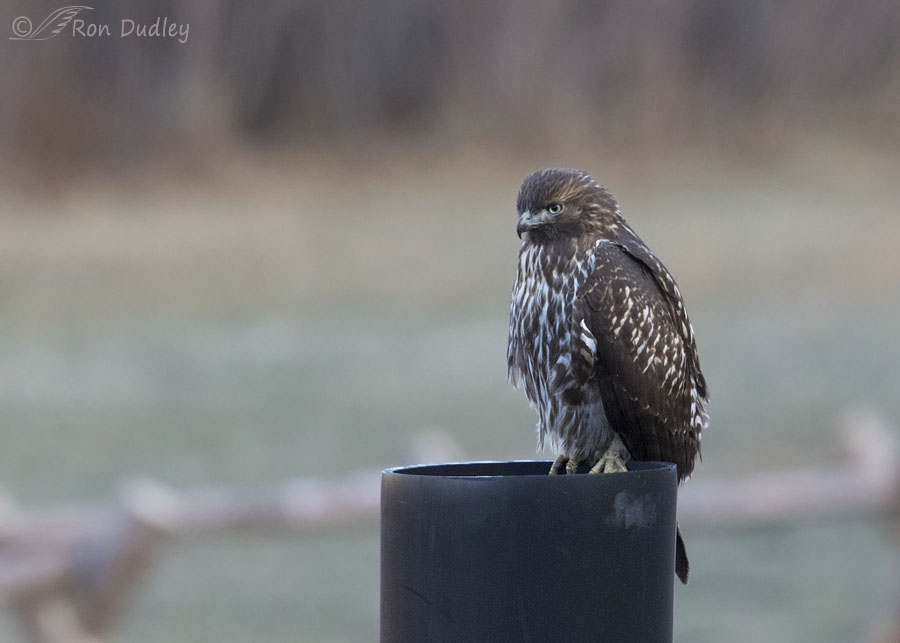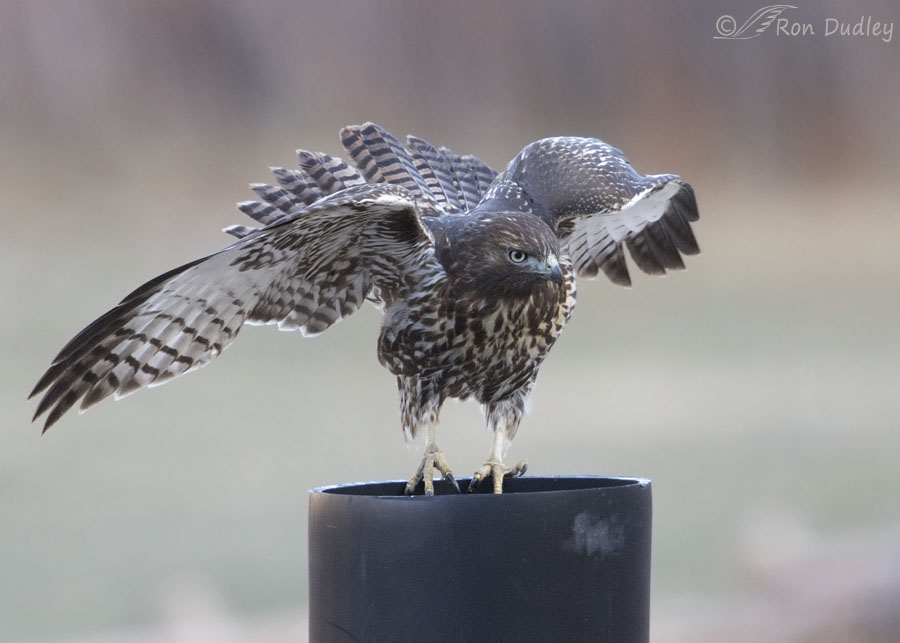Or the lack thereof…
Two days ago I encountered this juvenile Red-tailed Hawk on an unlikely and extremely foul-smelling perch. The photos are dark because the entire area was still in the dense shade of a nearby mountain. I was shooting at ISO 2000 in the last two photos if that tells you anything about the lighting conditions.

The hawk was perched on the vent stack of an outhouse in Little Emigration Canyon. Now let me tell you a little about this particular outhouse.
It has to be the most evil-smelling public outhouse in the entire state of Utah and I mean that! It always smells like it’s been used and abused and never mucked out for a hundred years. Several times this summer I tried to photograph small birds in some bushes next to a stream just out of view to the left but even though I was probably parked about 60′ away from it the damn thing smelled so bad at that distance that sometimes I had to leave. I can even smell it from the approach road above the outhouse from a couple of hundred feet away.
Other outhouses in the area and elsewhere don’t smell nearly this bad and in my opinion the Utah Department of Natural Resources should be ashamed of themselves for such piss-poor maintenance (bad pun intended). We always pass this outhouse up and if we need to we use another one elsewhere in the canyon.
So, what do you think it would smell like with your head directly over the vent pipe opening like this hawk had ‘his’ head? (I don’t really know the sex of the hawk and I wish he had turned his head this way for the photo). I simply can’t imagine the stink!
Which begs the question, how well do birds smell odors? The answer depends on who you talk to and the kind of bird involved but overall it’s a long-debated question with very few clear answers except that many birds probably don’t have highly developed senses of smell. A short summary on the subject from Stanford University can be found here if you have the interest.

But I simply can’t imagine how this hawk, if it had any significant sense of smell at all, could stand the stench for as long as it did (I saw it land here and it was still there when I left the area nine minutes later). That pipe is coming directly from the toilet vault and it makes my eyes burn just to think about what it had to smell like like up there.

But the hawk seemed to revel in it. Here it almost looks like he’s using the fumes as aroma therapy (though he was actually just turning on the perch). After he turned I left the area, I just couldn’t stand watching him suffer the stench.
Of course I’m aware that many animals with an excellent sense of smell don’t seem to be bothered by truly disgusting stinks (polar bears on ripe whale carcasses come to mind but there are many other examples). And my title was just a little tongue in cheek, I don’t really see this observation as reliable evidence either way.
But my tongue wasn’t in my cheek very far…
Ron
Note: It isn’t unusual for small birds to fall down these vent pipes and become trapped in the stinky muck below so many of our public outhouses have now had vent screens installed inside the tops of the pipes to prevent it. More here if you’re interested.


Very interesting, and great shots despite the light, Ron. I would think that the effluent also contains noxious fumes such as methane, CO-2 and carbon monoxide. Maybe some of the small birds get knocked unconscious and fall in.
Yes we have had a few owl come in to the rehab that have fallen in. I wish they would cover the vents!
They’re supposed to be in the process, April. I hope so.
Thanks Ron,
I did miss that final paragraph. I hope the rest covered asap.
Cheers,
Gail
Me too, Gail.
Ron, your photos and narrative along with comments from your readers certainly perked my interest about smells.
It is sad to hear that the birds fall into these unprotected pipes. Makes my heart ‘hurt’.
Thanks, Ron
It’s a fairly regular occurrence, especially with cavity nesting species. Thanks, Alice.
I am seeing this late today, but here is my input. The Stanford article is a good summary, but a bit old. Most birds seem to have a very limited sense of smell. Some birds with the best sense of smell are many seabirds and some New World vultures. Turkey Vultures and two vultures of the same genus in South America (Lesser Yellow-headed and Greater Yellow-headed Vultures) have a keen sense of smell, especially for chemicals called mercaptans (think skunk) which are found in small quantities the brain and abdomen and released at death. Old World vultures seem to lack a sense of smell as do Black Vultures in this country. (Black Vultures often follow Turkey Vultures while in search of food.) For seabirds (shearwaters, albatrosses, etc. smell is an important way to find food. Much of the open ocean is a desert but where plankton is found in quantity it gives off odors that travel along the ocean’s surface and can be followed for many miles. Plankton form the basis of the food chain here. Where there is plankton, there will be squid, fish, etc. Most birds that have been carefully studied seem to have some sense of smell, although sometimes very limited. The keenest sense of smell is found in Kiwis in New Zealand. Their nostrils are at the tip of the beak instead of at the base. They plunge the beak into the ground and sniff to find earthworms and other soil invertebrates. They also have foul-smelling droppings that are used to mark their territories.
Thanks for that comprehensive and fascinating summary, Dan. It echoes some of what I read on the subject but you summarized it extremely well! I never did find much on what we might know about the sense of smell in buteos.
HELL=Being in a car or an elevator with a heavily perfumed person…or how your osn hand smells after shaking hands with them!!!!
Yes, I agree, Patty.
Such a handsome young hawk, glad we can’t smell his perch from here! Great article on the Boy Scouts and the Teton Raptor Cenvter’s Poo-poo Project, I’m a big fan and happy to hear it’s reaching well beyond Wyoming. Perhaps when your “favorite” outhouse gets its screen — and clearly, it should — it will also get a thorough cleaning!
Great article on the Boy Scouts and the Teton Raptor Cenvter’s Poo-poo Project, I’m a big fan and happy to hear it’s reaching well beyond Wyoming. Perhaps when your “favorite” outhouse gets its screen — and clearly, it should — it will also get a thorough cleaning!
Chris, maybe the folks assigned to installing the screen will refuse to do so until that stench is dealt with. We can only hope…
LOL, hadn’t thought of that. Surely there’s some kind of oxygen mask those folks could use to minimize the stink while a screen is installed! But really, what excuse does the state have for not cleaning up something that SURELY they’ve heard plenty of complaints about??
Dying after falling down one of those vent pipes? What a truly awful way to go.
If the stench is as bad as you describe I hope that their sense of smell is less than stellar. Something we have that they don’t? A rarity. Though how I would love their vision…
Believe me, EC – it’s at least as bad as I described. There really are no words…
Love the photo of him spreading his wings. I’m with you – how in the world can that hawk perch on top of that pipe? I can’t go near those outhouses out in nature.
Everett Sanborn, Prescott AZ
Some of them are worse than others and believe me, this one might be the worse I’ve ever seen (smelled). Thanks, Everett.
A question that arose while reading this…. Experiments like those described in the Stanford article can inform us about the ability of various species to detect and use smells to guide their behavior, BUT those experiments do not address how the odor is experienced emotionally (like/dislike). What if the hawk could detect the odor, but the odor did not evoke either a noxious or a pleasant response? I did a brief search and found this article. http://www.dana.org/Cerebrum/2001/Ah,_Sweet_Skunk!_Why_We_Like_or_Dislike_What_We_Smell/
This is not my area of expertise (not sure I have one 13 years after retirement). I am not familiar with the pertinent literature and note that the article I found was written in 2001. But the issues involved in trying to study how other species PERCEIVE various sensory stimuli is one that still intrigues me.
Exactly, Dave. I’ve often wondered about that, including when I was preparing this post – it’s something very difficult to measure or quantify.
You might enjoy the book “Bird Sense” by Tim Birkhead. The author discusses each sense – sight, smell, hearing, etc. – as studied anatomically, chemically, etc. in birds. As to the question, do birds have a sense of smell? You bet. https://www.audubon.org/magazine/january-february-2014/birds-can-smell-and-one-scientist and https://www.mpg.de/568503/pressRelease20080716.
They sure do, Martha. The question is, how well is it developed in various species?
Oh my, that was not what I expected to see the Hawk standing on. What a laugh I got. It was a nice picture anyway. Thanks for sharing. You need to carry a perfume cloth with you at all times!
Trudy, I’m not sure what I’d rather smell, a stinky outhouse or most perfumes!
Very interesting article about birds’ sense of smell. I had long thought that Vultures operated by smell, but when I think about the altitudes at which I see them circling, and the fact that I can’t smell anything (I’m very sensitive to nasty smells), it makes sense that they would more likely be using vision to find their food. I won’t even go near the article about small birds and vent pipes. I envy that RTHA the ability to apparently not be affected by nasty smells.
Isn’t it funny how many of us are so affected by nasty smells when they don’t bother so many other animals at all?
Do like this post today! That second pose is such a familiar stance… I love it. There is so much to read into it if you are a bird lover who surmised ‘bird thoughts’. As to your story…I’ve wondered the same thing about certain birds…Turkey Vultures and Eagles eating carrion to be exact. They must have a keen sense of smell to catch it’s scent so high as they are flying and yet next you see rhey are right down in the thick of it ripping rotted flesh. Or perhaps better yet flocks of seagulls following a tractor spraying liquid manure. Those birds just ‘love ‘ digging in that stuff. I smell it for miles and will stay as far back as posible when driving.!
Kathy, gulls (and raptors) used to follow my tractor on the Montana farm but I wasn’t spreading manure. They were after critters stirred up by the plow or the drills if I was planting.
Well that makes more sense to me now…the tractors do both …the drag those big hoses spraying the liquid manure but cut into the field with something turning the soil. So they are looking for fresh critters but boy, they are in a manure bath! Doesn’t seem to bother them given the numbers of seagull that are there.
Oh Lordy. I can’t even imagine. Glad I wasn’t there lol. Beautiful shot of the bird though.
Thanks, Jean. There were days when I wish I HADN’T been there.
I laughed my way through this. I can’t imagine the stench. And I’m glad.
Arwen, between this outhouse. a dead skunk I haven’t really told you about and the stinky porcupine I’ve mentioned previously it was a smelly summer and fall for me.
It seems to me that the shape of the end of the pipe would serve as an uncomfortable rest for talons, all in all, a rather crappy perch.
Ha, crappy perch indeed!
Interesting post.
I guess I have to admit, I’m neutral about this question. It is hard for me to believe that birds have good eyesight, hearing, but not smell. Even though some species have a sense that is more used than the other senses, I still think that birds in one form or another use ALL their senses. And, when the situation presents itself will depend on one of those sense over the other. Maybe this hawk is able to withstand the odor or if the breeze is right can be up wind of it. Like us if our nose is plugged from whatever, we can’t smell anything either.
“It is hard for me to believe that birds have good eyesight, hearing, but not smell”
Here’s some interesting thoughts on that subject from the Stanford link, Dick.
“Most birds are primarily “sight animals” as their superb eyes, colorful plumage, and nonacoustic signals attest. But their sense of hearing is obviously also very acute — as in the case of night-hunting owls, which use sound to locate their prey. Most birds seemingly would have little use for smell in the airy treetops odors disperse quickly and would be of minimal help in locating obstacles, prey, enemies, or mates. Yet the apparatus for detecting odors is present in the nasal passages of all birds.”
Of far greater concern to me is the the vent is opens and this bird (probably not) or another smaller, cavity nesting bird, could think that this was an inviting cavity, fall into the toilet vault below and be trapped in the muck. The Teton Raptor Center has done a remarkable job with their “PooPoo Project” in getting these open vents covered and prevent using needless and horrific deaths to thorusands of birds each year! I urge you to contact your state to ask them to begin covering these open vents!
Gail, didn’t you see my note and the link at the bottom of this post? I believe this has already been done with most of our state owned outhouses and they’re still in the process with the rest of them. And they’re purchasing at least some of the screens from the Teton Raptor Center (as per the link I provided). The project continues…
Wonder if it’s “relative” as to what is a “bad” smell rather than the ability to smell? GHO’s will take skunks I’m told tho how they’d keep it out of their eyes is another matter!
I wondered the same thing, Judy – maybe some critters just aren’t hard-wired to be repelled by terrible smells. Yes, GHO’s are famous for preying on skunks and vultures have at least some confirmed ability to smell and we all know about their dietary preferences.